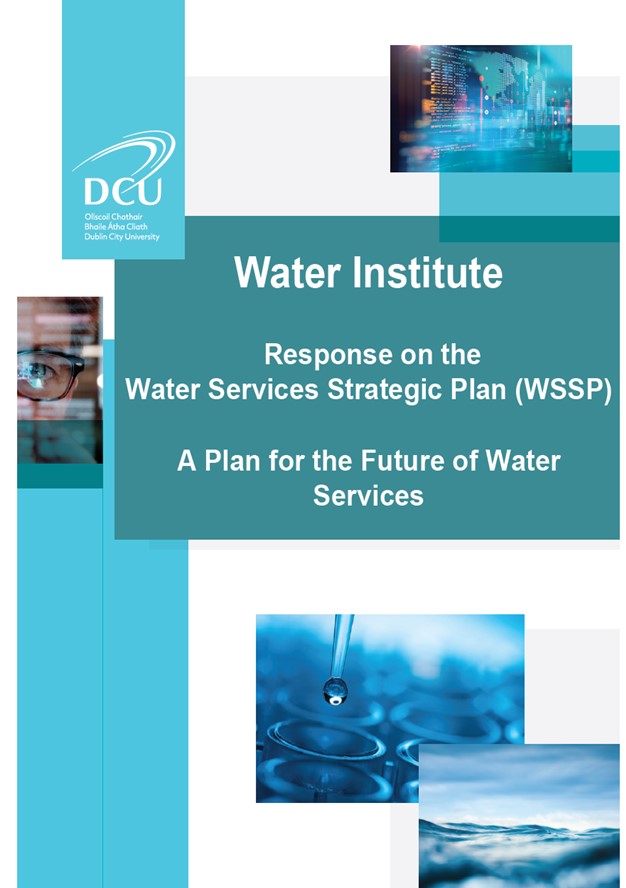Herein find a response from members of the DCU Water Institute to the open consultation on the Water Services Strategic Plan. The areas of focus include scope of the plan and timeline; climate change readiness; conservation; water quality and future innovation.
Date: March 1st, 2021
Scope and Timeline
- Timeline:
- Timeline as set out in the plan is 25 years, however given the amount of anticipated change (climate change, economic uncertainty, population growth etc.), we suggest considering a 25-year vision with a rolling 5-year action plan to enable reactivity and resilience. We need immediate investment and more urgent action on key areas.
- The plan does not set out a clear vision on prioritization of issues. We strongly recommend considering tackling major issues even if they are not the easiest to implement or address.
- The COVID-19 situation has demonstrated that previous barriers to large scale problems can be overcome (e.g. Dublin City Council investment in temporary mobility solutions). This can be used as an opportunity for large interventions.
- Scope:
- We strongly recommend considering a more ambitious plan underpinned by a communications and engagement strategy that emphasizes the value of water.
- Framing the water challenge within the wider context of climate change/ green deal/ sustainable development could help to address the interconnected nature of these challenges, as well as stimulating joint initiatives with other entities to solve the problem.
- We don’t see a philosophy to learn from others, to identify innovation or a willingness to work with public and private partners.
Climate change readiness and resilience
Consensus position
- The plan has not sufficiently recognized the significant challenges and risks posed by climate change. This is a missed opportunity for ensuring resilience and response readiness.
- Given the risks and unknowns, built-in flexibility based on robust risk assessment should be a cross-cutting dimension to the whole plan.
- Framing water problems within the wider scope of climate change adaptation could help with public perception and de-politicizing the issues.
- The plan focusses on supply rather than demand. Is there a need to have IW involved in the national planning for example to advise on high usage industries (data centres?)
Conservation, reuse and security
- The current conservation strategy focuses on fixing leaks. The lack of attention to the issue of water conservation through behaviour change, the uses of water, and the application of new technologies is a weakness.
- There is a need to address and shift Irish society’s perception of water as a free resource. Whilst it is a recognized challenge, it should be a major ambition within a 25-year strategy and will underpin all aspects of water management sustainability.
Water Quality
- Water quality is dependent on supply sources, and thus should be important components of the plan.
- There are current water quality issues that are public health concerns (lead, THMs, other contaminants etc.) that should be urgently addressed in the short term.
Investing in Our Future
The plan states “Promote research and utilise proven, innovative technical solutions to meet standards”.
- Can IW have a pro-active role in facilitating and promoting innovation? How can IW move to create an environment supportive of research to achieve practical aims. The language relating to research is not specific: “Engage with ..” rather than “Establish a framework to support engagement with research.
- Where will the expertise come to prove the suitability of innovative and state of the art solutions (page 77)?
- IF4a: “actively pursue R&D in water services and track opportunities…”. Does this suggest establishing a research branch or simply adopting innovation… there seems to be a disconnect between the strategy and purpose statements. Page 84: Should address diverging requirements for publication open data and business focus. IF4a: The term “pursue” is used. Should drive imply a more pro-active agenda?
- IF4b: “Engage effectively with university” The stated purpose is to ensure that existing and on-going R&D is exploited. Will IW take a pro-active role in helping to shape the R&D at research performing institutions. The stated purpose of focussing on existing research re-enforces the impression that the overriding objective is short term financial benefits rather than the establishment of a long term self-sustaining innovation ecosystem involving partnership between IW and third parties. The target is to guarantee that procurement is open to proven innovative technologies. What is the prospect for IW to become a partner in innovation actions with a role to play in piloting? This would require putting in place data management protocols that abide by EU rules (i.e. open publication).
General points
- The current policy of open engagement means that Irish Water don’t engage with any groups, though similar problems exist for other utility companies.
- Is there an opportunity to encourage Irish Water to fund research in areas of public engagement, behavioural change etc. What does the plan’s “engage with 3rd level” ambition mean?
- There is a focus on customer relations: “established as a customer focused and asset management driven” This is essential but should IW consider portraying a more public service perception: education, outreach…A 25 year plan does mean it is possible to plan on the long term working with younger generations. This is possibly addressed in IF3c page 79. Could engagement with education be specifically mentioned?
- IW should play a role in guiding policy and economic growth decision that will have an impact on water demand. (see page 17; role as a strategic consultee in the preparation of the National Planning Framework.)
A plan for water management is welcomed however, there are many key elements not adequately addressed. It is important that we don’t continue with more of the same for the next 25 years.
DCU Water Institute contributors:
Pat Brereton
Ruth Clinton
Yan Delaure
Edgar Morgenroth
Padraig Murphy
Anne Morrissey
Kieran Nolan
Fiona Regan
Reference Documents:
National Water Resources Plan: https://www.water.ie/projects-plans/our-plans/nwrp/NWRP-Draft-Framework-Plan.pdf
Irish Water consultation leaflet https://www.water.ie/projects-plans/our-plans/nwrp/NWRP_C2_Info-Leaflet_02.12.20_F02-WEB.pdf
Contact: waterinstitute@dcu.ie

